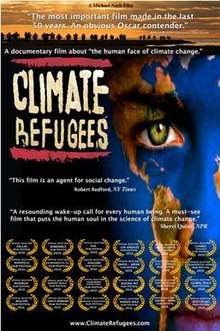Climate Refugees
Climate Refugees is a 2010 American documentary film, directed and produced by Michael P. Nash. The documentary attempts to cover the human impact of climate change by considering those who could most be affected by it.[1][2][3]
| Climate Refugees | |
|---|---|
 Theatrical release poster | |
| Directed by | Michael P. Nash |
| Produced by |
|
| Written by | Michael P. Nash |
| Music by | Michael Mollura |
| Edited by |
|
Production companies |
|
| Distributed by | Netflix (2013) |
Release date |
|
Running time | 89 minutes |
| Country | United States |
| Language | English |
| Budget | $1.6 million |
Content
With contributions from several politicians, scientists, and environmental activists, including House Speaker John Kerry, Newt Gingrich, Al Gore, Nobel Prize winner Wangari Maathai, the film documents the human plight of climate change with a focus on the intersection of over population, lack of resources and climatic change. Filmmaker Michael Nash and producing partner Justin Hogan traveled to 48 countries in search of the human face of climate change.
The film attempts to illuminate the national security implications of countries running out of food and water due to vast droughts and climatic shifts.[4]
Interviewees
Release
Its world premiere was 29 January 2010 at the 2010 Sundance Film Festival and it was released on August 17, 2011.[5] The film had a small theatrical release, and distributed by Netflix, iTunes and Amazon. It was particularly marketed through screening events, having been screened at the Senate and House, The Pentagon, The Vatican, and foundations including the United Nations COP15 climate summit in December 2009 in Copenhagen. Many screenings and discussion events for the film were held at universities.[6][7][8][9][10][11]
Reception
Robert Redford described it in the New York Times as "a resounding wake-up call for every human being." The documentary went on to play in over 100 festivals around the world winning multiple awards.
References
- Lowe, Justin. "Climate Refugees -- Film Review". The Hollywood Reporter. Retrieved 11 January 2016.
- Spears, Dorothy (2011-08-12). "Film on Climate Refugees Strikes a Chord". The New York Times. Retrieved 2016-01-09.
- "Climate Refugees (film)". Retrieved 2016-01-09.
- O'Lear, Shannon; Dalby, Simon (2015). Reframing Climate Change: Constructing Ecological Geopolitics. Routledge. p. 190. ISBN 9781317638650. Retrieved 13 January 2016.
- Barnes, Brooks. "Sundance Gets Quirky". New York Times. Retrieved 13 January 2016.
- Shelton, Dinah. ""Climate Refugees" Film Screening". Georgetown University. Archived from the original on 17 May 2016. Retrieved 11 January 2016.
- "Prince William County news in brief". Washington Post. Retrieved 13 January 2016.
- Fritz, Jeanine. "'Climate Refugees' director Michael Nash presents human picture of climate change". Daily Camera. Retrieved 13 January 2016.
- "Fall Oppenheim Event: Climate Refugees - A private screening and panel discussion after the film". UCLA Institute of the Environment & Sustainability. Retrieved 13 January 2016.
- Wiseman, Janet. "Film "Climate Refugees" Explores Impact of Climate Change". Franklin Environmental Center at Hillcrest. Middlebury College. Retrieved 13 January 2016.
- Revkin, Andrew. "Video View: 'Climate Refugees'". New York Times. Retrieved 13 January 2016.
Michael Schlesinger, a climatologist and professor at the University of Illinois, Urbana-Champaign, had his 81 students in his course on Climate and Global Change watch the film (at the suggestion of Emily Cross, a student who contributed a piece from the last round of climate treaty negotiations in December). I proposed that they write short reactions or reviews and vote for their favorites, which we would post on Dot Earth.